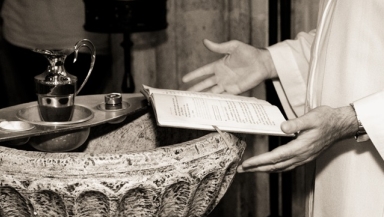
The devil, it is sometimes said, is in the detail. But in an experimental service from the Church of England, it is the absence of Satan from the small print which is causing a furore.
A trial liturgy for baptising children in church has been making waves because, while parents and godparents have traditionally been asked whether they "reject the devil and all rebellion against God," the suggested alternative format merely asks them to "reject evil".
Also proving contentious is the omission of any question asking whether those bringing a child to be christened are willing to repent – as has been the case up until now.
The service is currently being trialled. To come into permanent use, it would need to gain approval from the church's governing body, the General Synod. The existing wording in the Common Worship service book, with its references to the devil and to repentance, will remain in use either way – but the new liturgy could be used as an alternative.
What can be said about this suggested wording? The first point to make is that the proposed alternative has come about for commendable reasons. As the Church of England's liturgical commission states, concern about the existing service stem from worry that it is "not accessible to those who are unused to attending church". And such concerns are well-founded. The existing service is very wordy and lengthy – and as a practising Church of England minister I am aware that many parishes prune it severely.
It is also certainly good to try and put the language of the liturgy in words that people with no church background can understand. At the heart of the incarnation is the idea of God accommodating Himself to humankind by coming among us to speak our language directly, as it were. And much of Scripture comes in everyday vernacular in the original, I believe – however flowery subsequent translations may have been.
However, just because some Christian words and concepts are unknown in the wider secular world, it does not mean we should abandon them. Asking people to "reject evil" – and "all its many forms" and "all its empty promises" as the service continues – is not the same as the radical 180-degree change of heart and mind that is implicit in repentance. After all, Jesus begins his ministry with an invitation to "repent, for the Kingdom of Heaven is at hand". It is best to explain terms rather than abandon them – or at least use simpler terms which are equivalent. In this case, however, rejecting evil is not the same as repentance.
The omission of turning away from the devil is also unfortunate. Belief in Satan seems intrinsic in the teaching of Jesus (Luke 10v18), Peter (1 Peter 5v8) and Paul (Ephesians 6). Although this may seem as fanciful as Santa Claus to the secular world, many in Christian ministry can testify to having seen the reality of powerful, personal, demonic forces at work. As CS Lewis wrote in The Screwtape Letters, there are "two equal and opposite errors" into which people fall regarding demonic forces: "One is to disbelieve in their existence. The other is to believe, and to feel an excessive and unhealthy interest in them. They themselves are equally pleased by both errors, and hail a materialist or magician with the same delight."
Making Christian teaching accessible – by explaining it clearly – is good. Making it acceptable – by evacuating it of content so it is less challengingly counter-cultural to the secular world – is not. Unfortunately, in seeking to do the first, this trial liturgy has crossed a line over the second.













